|
De Belgische schrijver Leo Pleysier werd geboren in Rijkevorsel op 28 mei 1945. Zie ook mijn blog van 28 mei 2007 en ook mijn blog van 28 mei 2008 en ook mijn blog van 28 mei 2009 en ook mijn blog van 28 mei 2010xml:namespace prefix = o ns = "urn:schemas-microsoft-com:office:office" />
Uit: Dieperik
En terwijl hij zit te smullen, strooit hij er geregeld nog een paar lepels witte suiker over uit. (Bruine suiker is voor op mijn boterham met plattekaas. Of anders voor op een bord koude rijstebrij, vaders lievelingsdessert.)
Er zit al suiker in hoor!
Wat?
Dat er al suiker in zit!
En dus nog een lepel witte suiker. En nog een.
En nog een.
(
)
Razend kwaad en helemaal over zijn toeren was nonkel Wies. En dat bleef hij toen nog geruime tijd ja. Al stak hij me op het einde, en anders dan gewoonlijk, bij het afdrogen en terug aankleden een handje toe.
Gaat het?
Ik knikte en snikte van ja. Waarop hij met zijn eigen zakdoek mijn tranen bette en mijn neus en mond nog eens afdroogde.
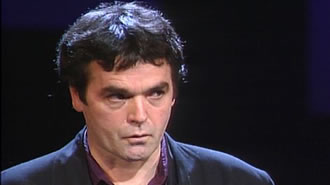
Leo Pleysier (Rijkevorsel, 28 mei 1945)
De Duitse schrijver Frank Schätzing werd geboren in Keulen op 28 mei 1957. Zie ook mijn blog van 28 mei 2007 en ook mijn blog van 28 mei 2008 en ook mijn blog van 28 mei 2009 en ook mijn blog van 28 mei 2010
Uit: Der Schwarm
Für die Menschen in Stavanger gab es nicht die geringste Überlebenschance. Wer versuchte, vor der Wasserwand davonzulaufen, die plötzlich in den Himmel ragte, rannte vergeblich. Die überwiegende Anzahl der Opfer wurde erschlagen. Das Wasser war wie Beton. Man spürte nichts. Kaum anders erging es denen, die wie durch ein Wunder den Aufprall überlebten, um dann gegen Häuser geschmettert oder zwischen Trümmerteilen zermalmt zu werden. Paradoxerweise ertrank so gut wie niemand, sah man von jenen ab, die in den zulaufenden Kellern gefangen waren. Selbst dort wurden die meisten schon durch die Wucht der hereinströmenden Wassermassen getötet oder erstickten im zusätzlich eindringenden Schlamm. Wer schließlich ertrank, starb einen schrecklichen, aber wenigstens schnellen Tod. Kaum einer von ihnen registrierte. Was mit ihm geschah. Von jeder Sauerstoffzufuhr abgeschnitten, trieben die Körper der Eingeschlossenen im lichtlosen, wenige Grad kalten Wasser. Das Herz begann unregelmäßig zu schlagen, transportierte weniger Blut und kam schließlich zum Stillstand, während sich der Metabolismus extrem verlangsamte. Dadurch lebte das Gehirn noch eine Weile weiter. Erst zehn bis zwanzig Minuten später erlosch die letzte elektrische Aktivität, und der endgültige Tod trat ein.
Nach weiteren zwei Minuten hatte die Gischt die Vororte Stavangers erreicht. Je großräumiger sie sich verteilte, desto flacher wurde die brodelnde Flut. Immer noch nahm ihre Geschwindigkeit ab. Das Wasser tobte und spritzte durch die Straßen, und wer hineingeriet, war hoffnungslos verloren, aber dafür hielten die meisten Häuser dem Drück fürs Erste stand. Wer sich deswegen in Sicherheit wähnte, freute sich dennoch zu früh. Denn der Tsunami verbreitet seinen Schrecken nicht nur bei der Ankunft. Fast noch schlimmer war es, wenn er ging.
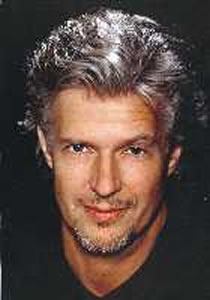
Frank Schätzing (Keulen, 28 mei 1957)
De Ierse schrijfster en columniste Maeve Binchy werd geboren op 28 mei 1940 in Dalkey. Zie ook mijn blog van 28 mei 2007 en ook mijn blog van 28 mei 2008 en ook mijn blog van 28 mei 2009 en ook mijn blog van 28 mei 2010
Uit: Heart and Soul
Mountainview, despite its pleasant name, was one of the tough areas of Dublin. Some of the big estates were home to drug dealers and it wasn't a place to walk alone at night. The school had its ups and downs, but it was lucky enough to have a headmaster, Tony O'Brien, who could deal with toughness head-on.Some of the older teachers found the change difficult. Things used to be different. The place had been shabby but they'd had respect. The children came from homes where money was short, but they were all keen to make something of themselves. Today they only cared about money, and if someone's big brother was driving a smart car and wearing an expensive leather jacket, it was hard to get interested in having a job in a bank or an office where you might never make enough to have your own house or car and a leather jacket was just a dream. No wonder so many of them joined gangs. And as for respect?Aidan Dunne told his wife, Nora, all about it.Big fellows would push past you in the corridor and sort of nudge the books out of your hand. Then they would laugh and say that sir must be losing his grip. Aidan remembered when they would rush to pick up the books. Not now. Now they called him Baldy, or asked him if he remembered the First World War.It was the same with the women teachers. If they weren't married, some of the really rough fellows would ask them were they frigid or lesbian. If they were married, they would ask them how many times a night did they do it.And what do you say? Nora wondered.I try to ignore them. I tell myself that they're only insecure kids like alwaysit's just they have a different way of expressing it. Still, it doesn't make the day's work any easier.And how do the women cope?
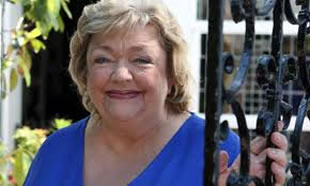
Maeve Binchy (Dalkey, 28 mei 1940)
De Indiaase dichter, vertaler en literatuurwetenschapper K. Satchidanandan werd geboren op 28 mei 1946 in centraal Kerala. Zie ook mijn blog van 28 mei 2009 en ook mijn blog van 28 mei 2010
Who said?
Who said
that waiting is a
railway station in North Malabar?
That a dawn in uniform
will arrive there in a coffin?
Who said
that memory is a fragrant window
opening on ripe cornfields?
That our bodies grow cold
as light grows dim there?
Who said
that trees have ceased to follow
winds language?
That we must conceal
from lilies and rabbits
the news of the death of love?
Who said
that now noons will be
heavy like a drunkards head?
That evenings will have sick hearts
like a lovers whispered songs?
Who said that we are running barefoot
over red hot iron
with a fistful of childhood rain?
That we will, at the end,
hand over our keys
to the same rain?
Who said that men once dead grow younger
and then they enter another Time?
That all the birds that vanished
at sunrise will return
when the world ends?
Who said
that we would understand everything
with no one saying anything,
but will still not share
anything with anyone?
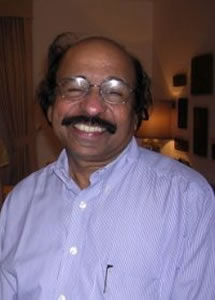
K. Satchidanandan (Kerala, 28 mei 1946)
De Ierse dichter en songwriter Thomas Moore werd geboren op 28 mei 1779 in Dublin. Zie ook mijn blog van 28 mei 2010 en eveneens alle tags voor Thomas Moore op dit blog.
The Minstrel Boy
The Minstrel-Boy to the war is gone,
In the ranks of death you'll find him;
His father's sword he has girded on,
And his wild harp slung behind him.
"Land of song!" said the warrior-bard,
"Though all the world betrays thee,
One sword, at least, thy rights shall guard,
One faithful harp shall praise thee!"
The Minstrel fell! -- but the foeman's chain
Could not bring his proud soul under;
The harp he loved ne'er spoke again,
For he tore its chords asunder;
And said, "No chains shall sully thee,
Thou soul of love and bravery!
Thy songs were made for the pure and free,
They shall never sound in slavery."
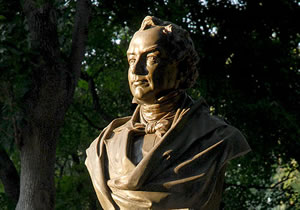
Thomas Moore (28 mei 1779 25 februari 1852)
Borstbeeld in Central Park, New York
Zie voor nog meer schrijvers van de 28e mei ook mijn vorige blog van vandaag en eveneens mijn eerste blog van vandaag.
|



